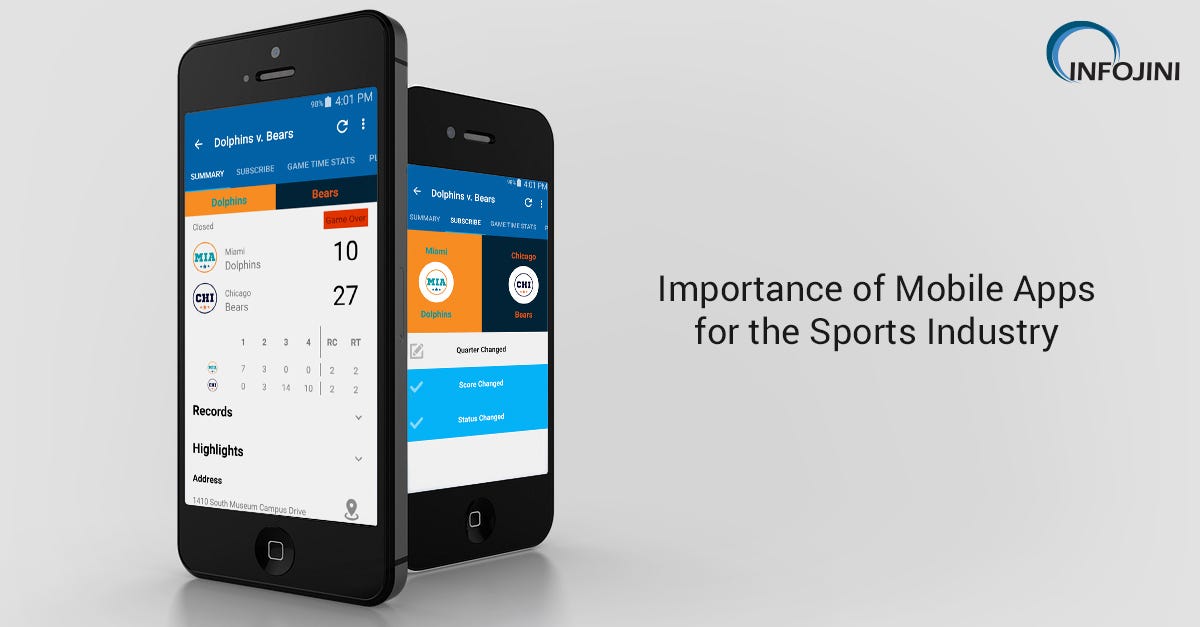The sports industry thrives on engagement, excitement, and accessibility. In today’s digital age, mobile apps have become indispensable tools for businesses across various sectors, and the sports industry is no exception. From enhancing the fan experience to streamlining operations and generating new revenue streams, mobile apps offer a multitude of benefits. Let’s delve into the reasons why mobile apps are crucial for the modern sports landscape.
Enhancing Fan Engagement
Mobile apps provide a direct and personalized connection between sports organizations and their fans. They offer a range of features designed to keep fans engaged and informed:
- Live Scores and Updates: Real-time scores, game statistics, and play-by-play commentary keep fans in the loop, no matter where they are.
- Personalized Content: Apps can be customized to deliver news, highlights, and merchandise offers based on a fan’s favorite teams, players, and sports.
- Interactive Features: Polls, quizzes, and fantasy sports integrations create interactive experiences that encourage participation and build community.
Driving Ticket Sales and Merchandise Revenue
Mobile apps can be powerful tools for boosting ticket sales and merchandise revenue:
- Mobile Ticketing: Conveniently purchase, store, and manage tickets directly from the app. Reduce paper waste and streamline entry to events.
- Exclusive Offers: Provide app users with exclusive discounts on tickets, merchandise, and VIP experiences.
- In-App Merchandise Store: Allow fans to browse and purchase team merchandise directly from their mobile devices.
Factoid: Did you know that mobile ticketing can reduce ticket fraud by up to 80%? The secure digital format makes it significantly harder to counterfeit tickets.
Streamlining Operations
Beyond fan engagement, mobile apps can also streamline various operational aspects of the sports industry:
Improving Communication
Mobile apps facilitate seamless communication between staff, athletes, and other stakeholders:
- Internal Communication: Share important announcements, schedules, and training materials with team members through a dedicated app.
- Emergency Notifications: Quickly disseminate critical information to fans and staff in case of emergencies or unforeseen events.
Data Collection and Analytics
Mobile apps can collect valuable data about fan behavior, preferences, and demographics. This data can be used to:
- Improve Marketing Campaigns: Target specific fan segments with personalized marketing messages based on their interests and behaviors.
- Optimize Operations: Identify areas for improvement in stadium operations, event planning, and customer service.
Generating New Revenue Streams
Mobile apps can unlock new revenue streams for sports organizations:
In-App Advertising
Sell advertising space within the app to sponsors and partners. Target ads based on user demographics and interests for maximum impact.
Premium Content Subscriptions
Offer exclusive content, such as behind-the-scenes footage, interviews, and analysis, through a premium subscription model.
FAQ ⎼ Frequently Asked Questions
Q: What are the key benefits of a mobile app for a sports team?
A: Key benefits include enhanced fan engagement, increased ticket and merchandise sales, streamlined operations, improved communication, and new revenue streams.
Q: How can a mobile app personalize the fan experience?
A: Apps can personalize the experience by delivering content based on a fan’s favorite teams, players, and sports. They can also offer exclusive discounts and promotions.
Q: Is a mobile app expensive to develop and maintain?
A: The cost of developing and maintaining a mobile app varies depending on the features and complexity. However, the potential return on investment can be significant;
Q: How can a mobile app help with data collection and analytics?
A: Mobile apps can collect data on fan behavior, preferences, and demographics. This data can be used to improve marketing campaigns, optimize operations, and personalize the fan experience.
Q: What are some examples of successful sports mobile apps?
A: Many professional sports teams and leagues have successful mobile apps that offer a wide range of features, including live scores, news, ticketing, and merchandise.
The Future of Sports and Mobile Apps
The integration of mobile apps within the sports industry is only set to grow in the coming years. As technology advances, we can expect to see even more innovative applications that further enhance the fan experience and optimize operational efficiency. From augmented reality experiences to personalized training programs, the possibilities are endless.
Emerging Trends in Sports Mobile Apps
Several exciting trends are shaping the future of sports mobile apps:
- Augmented Reality (AR): Imagine pointing your phone at a player on the field and instantly seeing their stats and background information; AR is poised to revolutionize the way fans interact with the game.
- Virtual Reality (VR): VR offers immersive experiences that allow fans to feel like they’re actually at the game, even when they’re miles away.
- Personalized Training Programs: Apps can provide customized training programs for athletes of all levels, based on their individual needs and goals.
- Blockchain Technology: Blockchain can be used to create secure and transparent ticketing systems, as well as to manage player contracts and intellectual property rights.
Factoid: The global sports tech market is projected to reach over $40 billion by 2026, driven by the increasing adoption of mobile apps and other digital technologies.
The Importance of User Experience (UX)
Ultimately, the success of any sports mobile app hinges on its user experience. A well-designed app should be intuitive, easy to navigate, and visually appealing. It should also provide users with the information and features they need in a timely and efficient manner.
- Intuitive Navigation: Users should be able to easily find what they’re looking for without getting lost or frustrated.
- Fast Loading Times: Nobody wants to wait for an app to load. Optimize the app for speed and performance.
- Responsive Design: The app should be responsive and adapt to different screen sizes and devices.
- Regular Updates: Keep the app up-to-date with the latest features and bug fixes.

